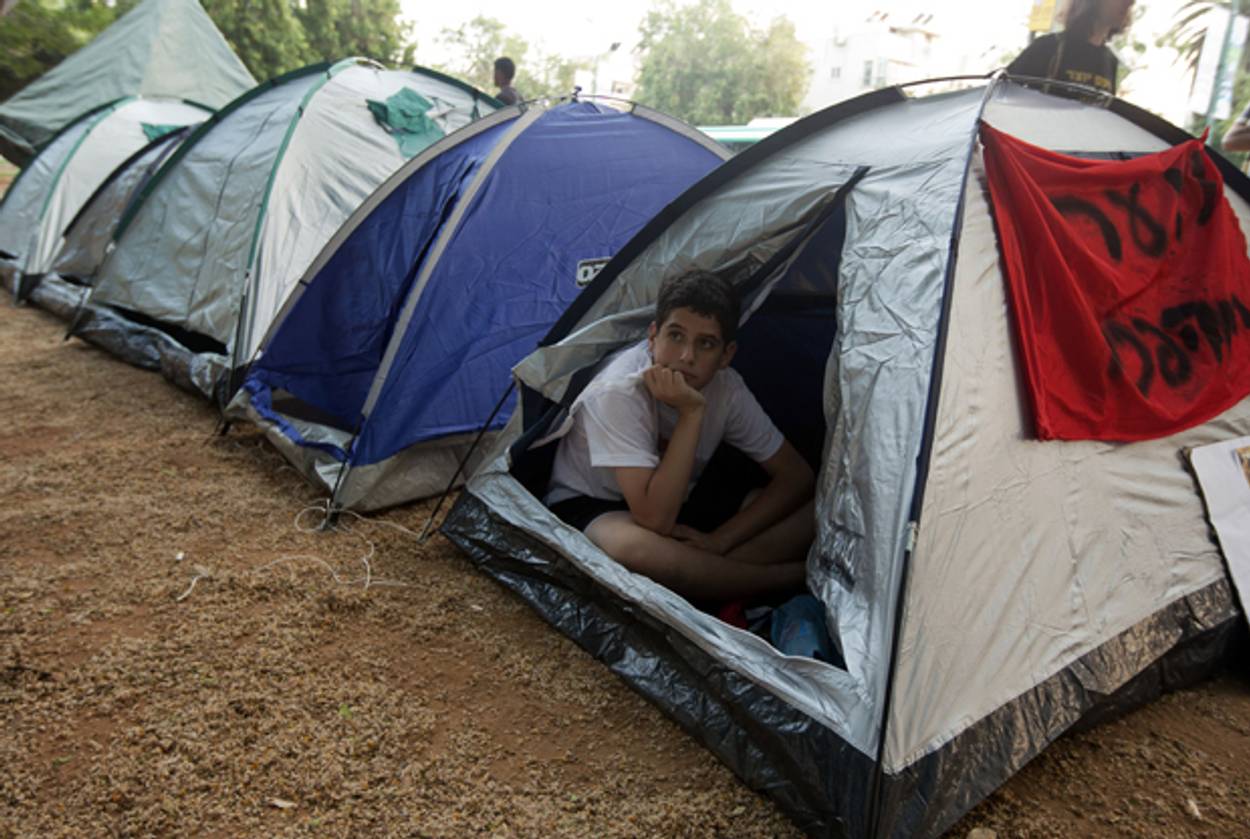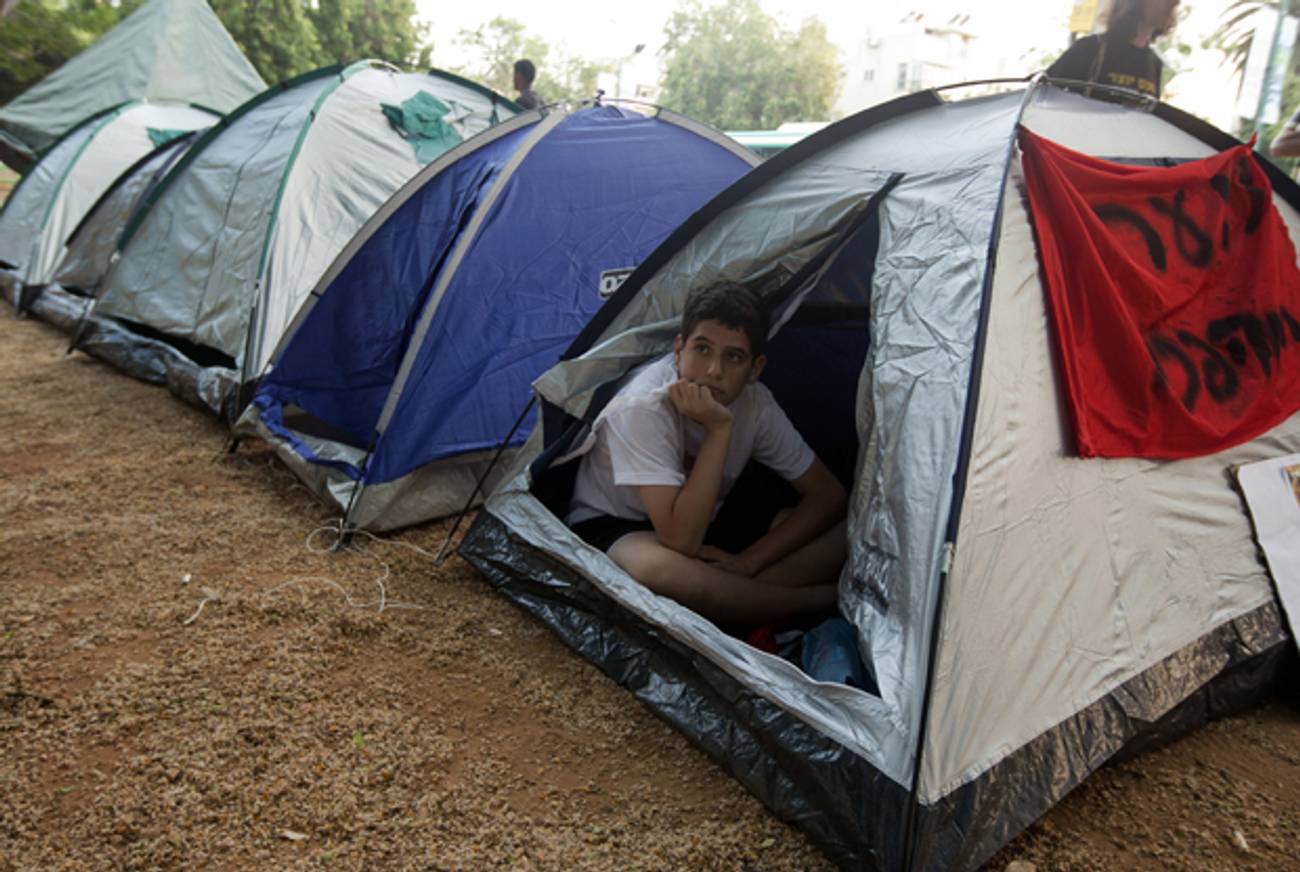My Less Equal Israel
Illegally occupy land, get politely moved. Protest for social justice, get beaten. I’m joining the protesters.




My father was a Revisionist, a follower of Ze’ev Jabotinsky. During the last months before he died this spring, I was fortunate enough to spend a lot of time talking with him—about what he thought of the State of Israel when he arrived here after World War II, and what he thought of it before he died.
Many of his stories had to do with the difficulties he had as a member of the Herut, the more right-leaning party, in the Israel of the 1950s and ’60s—a time when, if you didn’t have a membership card to the Histadrut, the labor union affiliated with the ruling socialists, you were a second-rate citizen. “This country,” my father told me, “has never been egalitarian. And in our family, when it came to ideology, we somehow always went for the less equal side.” When I saw Daphne Leef and her friends shouting familiar slogans and getting severely beaten, I couldn’t help but think about my father, may he rest in peace.
But I also thought about the residents of the Ulpana outpost, now required by a Supreme Court ruling to evacuate their homes, built on Palestinian-owned land. If Leef were a settler, I have no doubt that the Israeli police—and our prime minister—would make a concerted effort to show patience and sensitivity toward her, even if she’d chosen to break a law. Netanyahu would likely offer her alternate housing on nearby military land, like the Kirya in the middle of Tel Aviv, and he wouldn’t even do that until after the Supreme Court ruled against her.
But Leef isn’t a settler, so she’s doomed to be beaten. If Israel’s elite once carried the red Histadrut membership card, today the country has a new elite. A quick glance at the manner in which the law is enforced with regard to illegal construction in the occupied territories and on this side of the green line and we can see clearly that you’re better off breaking the law in the territories. If you’re ultra-Orthodox, you’ll find it much easier to meet the criteria for accessible housing set by the Minister of Housing and Construction, Ariel Atias, a member of the ultra-Orthodox religious party Shas. And if you’re a tycoon, you’ll find out soon enough that paying full taxes is merely a recommendation.
But even the country’s elite are allowed their moments of anger. So, if you still decide to break the law and damage property, as right-wing activists did in the Jewish-Arabic village of Neve Shalom, you’re better off scrawling on the vehicles you destroy, “Regards from Ulpana” and not, “The people demand social justice.”
I want to make it clear that I think smashing bank windows, as a few demonstrators did in the last protest, is wrong—if slightly less wrong than beating foreign workers, throwing rocks at the commander of the Ephraim Division, or building on land legally owned by someone else, all of which you can easily get away with here these days. Still, the lawbreakers who smashed the bank windows should be punished, but so too should the policemen who star in the YouTube clips hitting demonstrators without provocation.
And yet, all of this moral venting cannot be separated completely from the violence that is rearing its ugly head all around us—not just in the dark corners of our Israeli democracy, but also in the Knesset. When an entire leadership tries to pass laws to circumvent Supreme Court rulings and finds all sorts of ways to legalize the illegal, and when members of the government and the Knesset call foreign workers a cancer and make ignorant assertions about gay men and lesbians, the general atmosphere becomes such that it doesn’t always make it easy to distinguish between what is permissible and what is not.
I’m going to be at the next demonstration on Saturday. When the right to take to the streets and demonstrate is threatened, participation becomes compulsory. I read in the papers that the police are considering arming themselves with tasers this weekend. It’s not going to be pleasant, but that’s how it is when you decide to demonstrate—and you’re on the less equal side.
Translated by Sondra Silverston
***
Like this article? Sign up for our Daily Digest to get Tablet Magazine’s new content in your inbox each morning.
Etgar Keret is a Tel Aviv-based filmmaker and fiction writer. He writes a regular column from Israel for Tablet.
Etgar Keret is a Tel Aviv-based filmmaker and fiction writer.